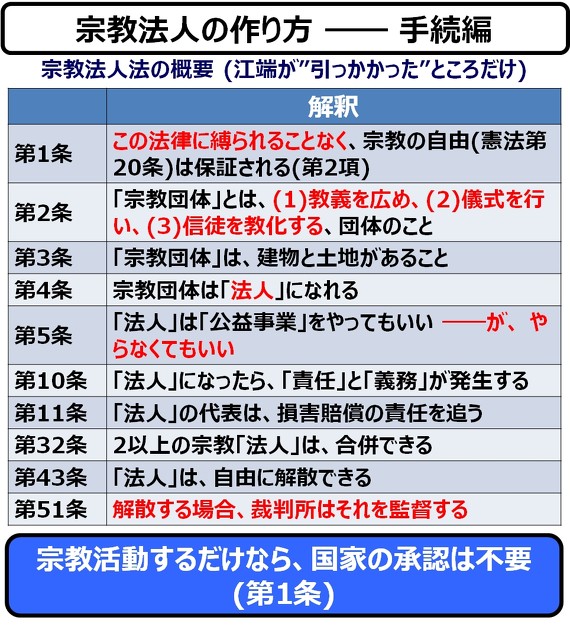2022-10-25 (2) (Implicit content) Don't talk about "freedom of religion (Article 20 of the Constitution)" when religious organizations take advantage of people's weakness of mind, and make believers' lives and livelihoods in danger. [長年日記]
I recently wrote a column about the Religious Corporation Law.

There has been a lot of talk lately about the "right to question" the former Unification Church.
To be honest, I "missed" this story.
It's a shame.
I also took the position of the Prime Minister's first opinion, 'If a person involved in a religious corporation does not have a criminal case, it is impossible to order the dissolution of the corporation,' because I had taken the position of the precedents.
However, if we strictly apply this decision (of the Supreme Court)
"Unless a terrorist attack is committed by a senior member of the church, the corporate status of the church cannot be revoked"
This is unreasonable in light of current social conventions and common sense.
The only people who really did such a thing (terrorism) are "unspeakable idiots" like the Aum.
It is clear that this religion group, formerly known as the Unification Church, has done the exact opposite of the ultimate purpose of religion -- "the peace of mind of the people" -- and no matter how many times it claims to have improved, it has not improved at all.
To begin with, I knew about this story in the early 1980's.
I feel incredibly "vicious" about the fact that this has now become an issue in the Diet.
I must also criticize myself. Apparently, I have fallen prey to the supremacy of the decision (Supreme Court decision).
-----
So, I am wondering about this Supreme Court ruling, maybe "this is it".
The dissolution order issued against the religious corporation that systematically and systematically produced sarin for the purpose of mass murder for the reasons stipulated in Article 81, paragraph (1), item (i) and the first sentence of item (ii) of the Religious Juridical Persons Act was issued with the intention of targeting only the secular aspects of religious corporations, and not with the intention of tolerating the spiritual and religious aspects of religious organizations and their followers. On the other hand, even if the dissolution order inevitably causes some hindrance to the religious activities of the religious organizations and their followers, such hindrance is only indirect and de facto, and under the circumstances described in the decision, it is necessary and unavoidable. Under the circumstances described above, the order is a necessary and unavoidable legal restriction, and does not violate Article 20, paragraph 1 of the Constitution.
Self-interpretation by Ebata as follows
(1) (Ostensibly), the purpose of Article 81 (dissolution order), Paragraph 1, Item 1 is designed to be applied to religious organizations that cause secular problems such as "mass murder. Therefore, there is no problem.
(2) (implied content) Don't let a mass-murdering terrorist group talk about "freedom of religion (Article 20 of the Constitution).
-----
Now, let's apply this to the group known as the Unification Church.
(1) (Ostensibly) The purpose of Article 81 (dissolution order), Paragraph 1, Item 1 was originally intended to be applied to religious organizations that cause secular problems, such as "insisting on 'donations' to induce believers to give up all their assets and bankrupt their families. So there is no problem.
(2) (Implicit content) Don't talk about "freedom of religion (Article 20 of the Constitution)" when religious organizations take advantage of people's weakness of mind, and make believers' lives and livelihoods in danger.
------
I am expecting that some of the interpretations of the Supreme Court's decisions will be changed in the direction of "applying precedents".